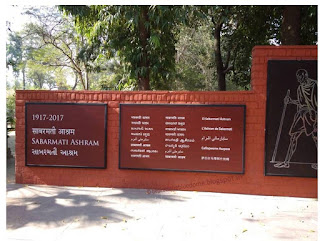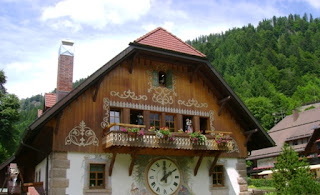Travel Guide to Gandhiji's Sabarmati Ashram Ahmedabad
Ahmedabad was a key city which was involved in Mahatma Gandhi’s
non-violent protests for independence against British rule. It was here that
Gandhiji set up his first ashram in 1915 after returning from South Africa. It
was named Kochrab Ashram. Two years later the ashram was shifted to what is now
known as Old Vadaj.
Located on the banks of the pristine Sabarmati River, the Sabarmati Ashram became the core of the freedom struggle movement and is today a national monument. One of the most iconic Satyagrahas was the 1930 Salt march to Dandi, a village on coastline of the Arabian sea, as a protest against the imposition of tax on salt.
Unique Features of Sabarmati Ashram
Library Archives
Don't miss the postal letter box at the entrance.
The Sabarmati Ashram has various names, namely:
(1) Gandhi Ashram
(2) Harijan Ashram
(3) Satyagraha Ashram
However, if you wish to visit Gandhiji’s first ashram and the auto driver does not know it by the name of Kochrab Ashram, then you have to specify that you do not wish to visit the Sabarmati one but say that you want to visit the Gandhi Ashram at Paldi near the V.S. Hospital.
Timings: 8.30a.m. to 6.30p.m. The Ashram is open on all days.
For details contact: +91-79-27557277
Located on the banks of the pristine Sabarmati River, the Sabarmati Ashram became the core of the freedom struggle movement and is today a national monument. One of the most iconic Satyagrahas was the 1930 Salt march to Dandi, a village on coastline of the Arabian sea, as a protest against the imposition of tax on salt.
 |
| Sabarmati riverfront near the Ashram |
Unique Features of Sabarmati Ashram
Hridaykunj
The humble home where Gandhiji resided with
Kasturba from 1918 to 1930.
 |
| Gandhiji's room in Hriday Kunj |
Home of Maganlal Gandhi, one of Gandhiji’s
first disciples. Read more about him at http://www.mkgandhi.org/associates/Maganlal.htm
Vinoba Kutir |
| Magan Nivas |
Another modest home on the ashram premises is
where Vinoba Bhave lived from 1918 to 1921. He was regarded by Ganhiji to be a
model satyagrahi due to his commitment to truth. This same house came later to
be known by the name of ‘Mira Kutir’. The reason: Madeleine Slade, a young
English lady, on learning about Gandhiji’s idealogy through a book by Ronald Rowland, came to
stay here (from 1925 to 1933) as his disciple and was given the name of Mira by
Gandhiji.
Somnath Chhatralaya
 |
| Vinoba Kutir |
Somnath Chhatralaya
In 1921, with financial assistance from Shri Somnathji, Gandhiji set up
a hostel block as a training centre to impart values to freedom fighters on how
to serve society and become leaders of the community. Post-independence, his
disciple, Parikshitlal Majumdar, started training women at the centre to become
primary school teachers. Ladies from the rural areas thus gained economic
independence and, at the same time, a literacy movement started with the
children of their localities getting education.
Gandhi Samarak Sangrahalaya
 |
| Somnath Chhatralaya |
Gandhi Samarak Sangrahalaya
This is a pictorial and written
documentation gallery which depicts Gandhiji’s life and work. There are
life-size paintings and over 200 enlargements of his life.
Charkas
There are various models of Charkas from around the world.
Library
 |
| Depiction of Dandi march |
Charkas
There are various models of Charkas from around the world.
Library
It is wholly devoted to Gandhian literature, home
to over 35,000 books on Gandhiji’s life & work as well as his teachings and
aspects of the freedom movement.
Library Archives
There is a wonderful archive of letters,
too, written by Gandhiji, as also his articles and over 6000 photographs of
Gandhiji and his associates.
Reading room
Reading room
Here you can browse through numerous
periodicals in three languages, namely, English, Hindi and Gujarati.
Souvenir shop
You can purchase post cards, books and
bookmarks, stationery, Khadi garments, miniature models of charkas, etc.
 |
| Souvenir Shop |
Don't miss the postal letter box at the entrance.
(1) Gandhi Ashram
(2) Harijan Ashram
(3) Satyagraha Ashram
However, if you wish to visit Gandhiji’s first ashram and the auto driver does not know it by the name of Kochrab Ashram, then you have to specify that you do not wish to visit the Sabarmati one but say that you want to visit the Gandhi Ashram at Paldi near the V.S. Hospital.
Timings: 8.30a.m. to 6.30p.m. The Ashram is open on all days.
For details contact: +91-79-27557277












Comments
Post a Comment